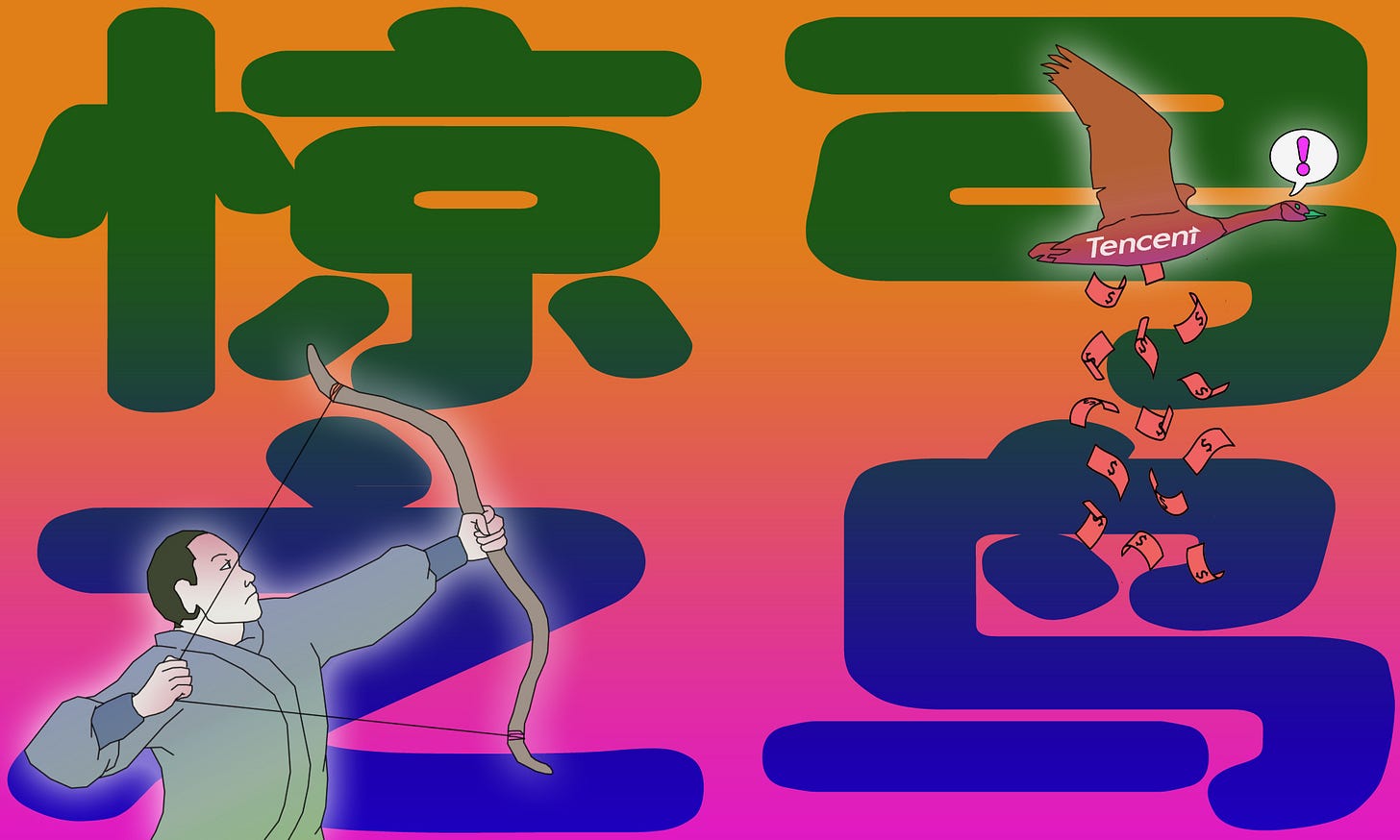“A bird frightened by the sound of a bow” — Phrase of the Week
Draft regulations in China’s gaming sector has spooked investors. And it’s not the first time it’s happened.
Our Phrase of the Week is: A bird frightened by the sound of a bow (惊弓之鸟 jīnggōng zhīniǎo).
The context
Chinese regulators announced on 22 December a wide range of rules aimed at curbing spending and rewards in video games.
The National Press and Publication Administration, which is the regulatory body that oversees the sector, issued a notice to publicly solicit opinions on the “Online Games Management Measures (Draft for Comments).” (网络游戏管理办法草案征求意见稿).
The public has until 22 January to respond.
If implemented, the new rules would curb “predatory transactions” (诱导性消费) in games aimed at young users:
Including banning enticing in-game rewards for daily login, first-time recharge, and continuous recharges.
网络游戏不得设置每日登录、首次充值、连续充值等诱导性奖励。
wǎngluò yóuxì bùdé shèzhì měirì dēnglù, shǒucì chōngzhí, liánxù chōngzhí děng yòudǎoxìng jiǎnglì.
The announcement sparked panic among investors.
On the afternoon of 22 December, among Hong Kong-listed gaming companies, Tencent, Xindong, China Mobile Games and other companies all fell by more than 10%, and NetEase fell by more than 20%.
Nearly $80 billion in market value was wiped from Tencent 腾讯 and Netease 网易, China’s two biggest gaming companies.
This is not the first time the gaming sector, its companies and investors, have been spooked by government statements relating to controls in the sector:
In August 2021, the “Economic Information Daily” run by Xinhua News Agency published an article titled “The industry of ‘Spiritual Opium’ now worth hundreds of billions”. At that time, this article had a direct impact on the stock prices of many game-related companies within one day, and many media began to describe the gaming industry as “a bird frightened by the sound of a bow”.
2021年8月,由新华社主管主办的《经济参考报》曾刊登了一篇文章,名为《“精神鸦片”已长成数千亿产业》。当时这篇文章在一天之内对诸多游戏相关企业的股价产生直接影响,不少媒体开始将游戏行业形容为“惊弓之鸟”。
2021 nián 8 yuè, yóu xīnhuáshè zhǔguǎn zhǔbàn de “jīngjì cānkǎo bào” céng kāndēng le yìpiān wénzhāng, míngwéi “‘jīngshén yāpiàn’ yǐ zhǎng chéng shù qiān yì chǎnyè”. Dāngshí zhèpiān wénzhāng zài yìtiān zhī nèi duì zhūduō yóuxì xiāngguān qǐyè de gǔjià chǎnshēng zhíjiē yǐngxiǎng, bùshǎo méitǐ kāishǐ jiāng yóuxì hángyè xíngróng wéi “jīnggōng zhīniǎo”.
And with that, we have our Phrase of the Week!
What it means
‘A bird frightened by a bow” is a four-character idiom which directly translates as “frightened” 惊,“bow” 弓, “the bird” 之鸟.
It dates back to Intrigues of the Warring States (战国策 zhànguócè), an ancient Chinese text containing anecdotes of political manipulation and warfare during the Warring States period (5th to 3rd centuries BC).
The original text containing the idiom is in the Fourth Strategy of Chu (楚策四 chǔ cè sì), recording a conversation between Gēng Léi 更羸 , a famous archer, and the king of the State of Wei.
Geng Lei said to the King: “Your majesty, I don’t even need to shoot my arrow, I only need to pluck my bow, and I can shoot the flying bird down.”
“You really have that kind of ability?” the King asked. Geng Lei said, “Yes.”
They sat and waited. A flock of wild geese flew from the east. Geng Lei held his bow, and plucked the tight string. One goose fell from mid-air.
更羸谓魏王曰:“臣为王引弓虚发而下鸟。”魏王曰:“然则射可至此乎?”更羸曰:“可。”有间,雁从东方来,更羸以虚发而下之。
Gēng léi wèi wèi wáng yuē:“Chén wèi wáng yǐngōng xūfā ér xiàniǎo.” Wèi wáng yuē:“Ránzé shè kě zhìcǐ hū?” Gēng léi yuē:“Kě.” Yǒu jiān, yàn cóng dōngfāng lái, gēng léi yǐ xūfā ér xiàzhī.
Geng Lei goes on, “this goose has already been injured by an arrow, and is unable to keep up with the flock.”
So it’s no surprise the bird is spooked by the sound of his bow, Geng explains.
The modern idiom describes a situation where someone, a company, or in this case an entire sector, has been hit before, unable to recover from the trauma of the experience, so sensitized to a repeat.
The proposed changes in the gaming sector are no surprise. But investor reactions tell a story of anxiety and uncertainty, like a bird frightened by the sound of a bow.
Andrew Methven is the author of Slow Chinese 每周漫闻, a resource to help learners of Chinese maintain and improve their language skills, and keep on top of the latest language trends in China. Read more.



